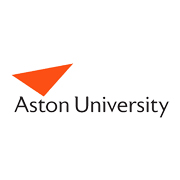fees waived
Optometry, MOptom (Hons)
Aston University, United Kingdom
Subject ranking
UK / Guardian 2025 4th
UK / CUG 2024 6th
UK / Guardian 2025 21st
Costs
food & rentS$17.1K / year
Entry requirements
Scholarships
21 - 50 available
10 available
10 available
Limited quantity
Information
Code
Intakes
Website (External)
Programmes
Information
Duration
2029
Aston School of Optometry pioneered an updated Master of Optometry (MOptom) programme in September 2023, aligning with General Optical Council standards. This four-year course integrates clinical experience from the first year, culminating in a 44-week paid Clinical Learning in Practice (CLiP) placement. Optometrists are skilled clinicians who diagnose and treat visual issues, examining eyes to detect disorders linked to the eye, brain, or body. Students gain practical skills through supervised sessions at the Aston Eye Clinic, virtual reality simulators, external clinical settings, and interprofessional learning.The curriculum progresses through integrated themes in professional practice, patient care, and management, building knowledge from scientific foundations to advanced ocular disease and specialist services. By year one, students develop core clinical skills; by year two, they perform full eye examinations; year three focuses on specialist experience; and the final year involves supervised placement. Assessments include exams, reports, presentations, and clinical evaluations, with the programme accredited by the General Optical Council, offering strong graduate prospects and high rankings in UK university guides.
Our integrated curriculum structure allows you to see how the material you learn throughout the course is connected. You’ll study twelve integrated themes, within three broad areas of study: The Professional: Themes focusing on the safe and effective delivery of care and supporting you in the development of your professional identity as an optometrist, including developing an evidence-based approach to practice. The Patient: Themes covering health and disease, ocular structure and function, and how optometrists examine the eye to detect abnormality. You will learn how to examine the eyes using a wide range of the latest technology. The Management: Themes focusing on how optometrists manage patients using optical appliances including spectacles, contact lenses and low vision aids, pharmacology and prescribing. Themes run throughout the course, so you build on your knowledge and skills in a progressive way. Year 1 You will develop your knowledge of the scientific principles that underpin optometry, while acquiring a range of core clinical skills. You will begin to demonstrate professional skills and behaviours which are required for registration as an optometrist and complete a one-week period of external clinical learning at a local practice. Year 2 You will further your knowledge of the scientific foundations of the profession and extend your skills in clinical assessment and interpretation. A range of person-centred care themes are explored in readiness for increasing patient exposure. By the end of the year, you’ll be able to complete a full eye examination, fit a variety of contact lenses, advise on spectacles and perform a range of techniques to investigate binocular vision. Year 3 You will see a wide range of patients in our public service clinic and gain experience in specialist optometry services. Develop further knowledge in areas such as ocular disease and abnormality, specialist practice and refine your professional skills required for a career in optometry. You will work on our virtual reality simulators to gain experience of a wide range of ocular disorders. Year 4 You will work under supervision as a student optometrist during your 44 week paid CLiP placement. You will be supported in applying for and securing a CLiP placement by the Careers and Placements team, the Aston School of Optometry careers tutor, and the College of Optometrists. As you’ll be based away from Aston, course material will be delivered online and you’ll have regular tutorials to stay in touch with your tutors and fellow students. Once you have successfully completed stage 4 and achieved the MOptom, you’ll be able to apply to join the GOC register as a qualified optometrist.
A local representative of Aston University in Singapore is available online to assist you with enquiries about this course.

